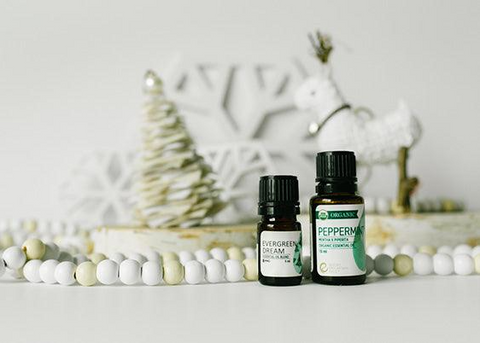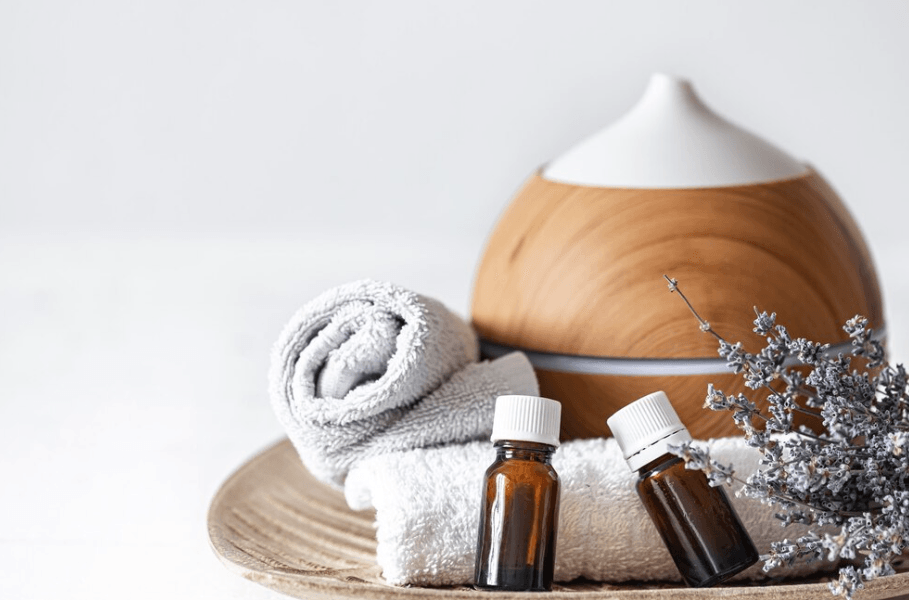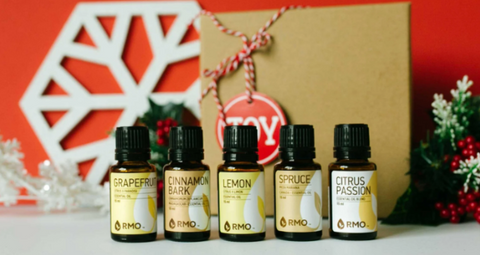How Much Essential Oil To Add to Diffuser for an Aromatic Experience: 7 Expert Tips
Hello, dear reader! If you're diving into the world of essential oils, you're in for a treat. Their therapeutic benefits have been cherished for centuries. But, have you ever pondered, "How much essential oil should I add to my diffuser?" Well, let's untangle this query.

Understanding Diffusers and Essential Oils
Diffusers are lovely devices that disperse essential oils into the air, filling a space with aromatic bliss. Depending on their design, they can offer additional benefits, such as increased humidity. Now, let's talk about these captivating elixirs – essential oils. Derived from plant parts, these oils can uplift, calm, rejuvenate, and more.
What are diffusers?
Diffusers are devices that release essential oil particles into the air. They come in various types: ultrasonic, nebulizing, heat, and evaporative. Each has pros and cons, but all aim to enhance our living spaces with the power of aromatherapy.
Benefits of using essential oils with diffusers.
When diffused, essential oils create an ambiance that can enhance mood, boost energy, promote relaxation, and more. Some oils even possess antimicrobial properties!
Different types of diffusers and how they work.
Each diffuser type works differently. For instance, ultrasonic diffusers use water and ultrasonic vibrations, while nebulizing ones use an atomizer. The type of diffuser can influence the amount of essential oil you'll need.
How Many Drops of Essential Oil Do You Put in a Diffuser?
Diffusing essential oils is widespread and has gained traction among wellness enthusiasts worldwide. But a common question arises when it comes to this: How many drops of essential oil should you put in a diffuser? Let's dive into this topic and uncover the best practices.
Understanding Essential Oils and Their Potency
First and foremost, it's crucial to understand the nature of essential oils. Derived from plants, essential oils are highly concentrated, meaning a little goes a long way.
- Concentration Matters: Unlike diluted or blended oils, pure essential oils pack a strong punch. Hence, using too much can be overpowering and, in some cases, even harmful.
General Guidelines for Diffusing
While the amount of oil you should use can vary based on personal preference and the specific diffuser you own, there are some general guidelines to follow:
- Basic Rule of Thumb: For a standard diffuser (100ml capacity), 3-5 drops of essential oil are usually recommended.
- Larger Diffusers: If your diffuser has a larger capacity, say 200ml or more, consider adding 6-10 drops. But always start with less and add more if needed.
- Your Sensitivity: Some people might be more sensitive to certain oils. If you're new to diffusing or trying a new essential oil, start with 1-2 drops and adjust according to your comfort.
Factors That Can Influence the Amount
There is more than one-size-fits-all answer to the question of how many drops to use. Several factors come into play:
- The Room Size: A more prominent room may require more oil to disperse the scent effectively. Conversely, fewer drops might be more appropriate for a small room or personal space.
- The Oil's Intensity: Some essential oils have a more intense aroma than others. For instance, eucalyptus or peppermint might be more potent than lavender.
- Purpose of Diffusion: Are you diffusing for a subtle scent or therapeutic reasons? You might use a slightly higher quantity if you aim for therapeutic benefits. However, always ensure it's comfortable and manageable.
Potential Issues with Overuse
It's essential to be mindful and not overdo it. Here's why:
- Health Concerns: Overexposure can lead to headaches, nausea, or allergic reactions in some individuals. Be cautious, especially if you have pets, as certain oils can be toxic to them.
- Waste of Resources: Essential oils can be pricey. Using more than required is wasteful and can strain your pocket.
It's always better to start with fewer drops and add more if needed when diffusing essential oils. Listen to your body and adjust to your comfort and the abovementioned factors. Remember, the goal is to create a pleasant, beneficial ambiance, not to overpower the senses. So, next time you're about to diffuse, ask yourself: How many drops of essential oil will create the perfect atmosphere for me today?
Why Use an Essential Oil Diffuser?
The allure of essential oils is undeniable. From the mesmerizing scents to the therapeutic benefits, they've etched a permanent spot in many households. But if you're still on the fence about buying a diffuser or curious about why they're so they're, you've come to the right place. Let's explore why an essential oil diffuser is incorporated into your daily routine.
The Magic Behind Diffusion
To appreciate the value of a diffuser, it's essential to understand the science behind it. Essential oil diffusers work by dispersing tiny molecules of the oils into the air. This creates a mist you can inhale, allowing for aromatic and therapeutic benefits.
Top Reasons to Use an Essential Oil Diffuser
Ambiance Creation:
- The power of scent in setting a mood is phenomenal. Want to create a relaxing atmosphere? Diffuse some lavender. Need to feel energized? Citrus oils like lemon or orange can do the trick.
Therapeutic Benefits:
- Essential oils aren't just aren't aromas; many have inherent therapeutic properties.
- Stress Reduction: Oils like chamomile or ylang-ylang can help reduce feelings of stress and anxiety.
- Improved Sleep: If you struggle with insomnia or restless nights, consider diffusing oils like lavender or cedarwood before bedtime.
- Respiratory Support: Eucalyptus and peppermint can aid in opening up airways, making breathing a tad easier during cold seasons.
Natural Air Freshener:
- Instead of using commercial air fresheners packed with chemicals, why not opt for a natural, toxin-free alternative? An essential oil diffuser can help eliminate odors and introduce pleasant fragrances into your space.
Humidification:
- Many diffusers also act as humidifiers, adding moisture to the air. This can be particularly beneficial in dry climates or during winter when indoor air becomes dry.
Enhanced Focus and Productivity:
- Need a pick-me-up during a long workday? Oils like rosemary and lemon enhance concentration and invigorate the mind. Why not give them a shot during your next brainstorming session?
Immune System Boost:
- Some essential oils, like tea tree and frankincense, are known for their antimicrobial properties. Regular diffusion can help in warding off germs and keeping you healthier.
Safe and Easy to Use:
- Diffusers are typically straightforward devices. Add water a few drops of your favorite essential oil, and voila! You're set—you're of aromatic bliss.
Things to Consider
While diffusers offer a plethora of benefits, there are a few considerations to bear in mind:
- Quality Matters: Not all essential oils are created equal. Ensure you're using high-quality oils without any synthetic additives.
- Pets and Kids: Some essential oils can harm pets or children when diffused. Always research and exercise caution.
Essential oil diffusers are more than just trendy gadgets; they can significantly enhance your living space and well-being. From setting the perfect ambiance to reaping therapeutic benefits, the reasons to incorporate one into your daily routine are vast. So, the next time someone asks you, Why use an essential oil diffuser? You'll have compelling reasons at your fingertips!
How Do Oil Diffusers Work?
Essential oil diffusers have become a staple in many homes, spas, and wellness centers around the globe. They're revered for creating soothing atmospheres and delivering therapeutic benefits. But have you ever stopped to ponder the question, How do these little devices work? Let's journey into the mechanics and science behind oil diffusers.
Breaking Down the Basics
At their core, essential oil diffusers serve one primary function: to release important oil molecules into the air. This process allows the aromatic properties of the oils to spread throughout a space, letting you inhale and enjoy both the scent and potential health benefits.
Types of Oil Diffusers and Their Mechanisms
While various diffusers are on the market, they all function based on a few fundamental principles. Here's a breakdown:
Ultrasonic Diffusers:
- Principle: Uses water and ultrasonic vibrations.
How It Works:
- You add a few drops of essential oil to water in the diffuser.
- The device uses ultrasonic waves to break the mixture into tiny particles, creating a fine mist.
- This mist, laden with essential oil molecules, is released into the air.
Perks:
- It acts as both a diffuser and a humidifier.
- Typically quiet in operation.
Nebulizing Diffusers:
-
Principle: No water, pure oil diffusion.
How It Works:
- Utilizes an atomizer to create fine, airborne particles from pure essential oils.
- These particles are then blown into the air.
Perks:
- It offers a potent aroma since it uses undiluted oils.
- She is considered one of the most therapeutic diffusers due to the purity of the oil dispersed.
Evaporative Diffusers:
- Principle: Natural evaporation of oils.
How It Works:
- A pad or filter is infused with the oil.
- A fan within the diffuser then blows air through this pad, causing the oil to evaporate and disperse into the surroundings.
Perks:
- Simple mechanism.
- Portable and often battery-operated.
Heat Diffusers:
- Principle: Using heat to cause evaporation.
How It Works:
- Essential oil is placed on a tray or compartment.
- Heat (either from a candle or electricity) warms the oil, causing it to evaporate and rise as scented vapor.
Perks:
- Silent in operation.
- Often aesthetically pleasing.
Downside:
- Heat can alter the chemical properties of the oils, potentially reducing therapeutic benefits.
Why the Hype Around Diffusion?
Now that we understand the mechanics let's address the 'why' briefly:
- Effective Dispersion: Diffusers break down essential oils into micro-molecules, aiding effective dispersion and inhalation.
- Ambiance Creation: They offer an easy way to set a desired mood or atmosphere in a room.
- Potential Health Benefits: Different oils offer varied therapeutic benefits when inhaled, from relaxation to invigoration.
Oil diffusers are not just about wafting pleasant scents into a room; a blend of art and science is at play. Whether you're drawn to the potency of a nebulizing diffuser or the dual function of an ultrasonic one, understanding how they work can heighten your appreciation for these ingenious devices. So, next time you switch on your diffuser and a gentle mist fills the room, you'll know precisely what marvels are at work!
How Many Drops of Oil Should You Put in an Oil Diffuser?
Ah, the alluring world of essential oils! As you uncap that bottle of lavender or eucalyptus oil, the tantalizing aroma instantly transports you to a world of relaxation and tranquility. But as you hold the bottle over your diffuser, a pertinent question arises: How many drops of oil should you use? Let's navigate this aromatic dilemma together.
Decoding the Diffusion Equation
The art of diffusion isn't just about random droplets; it's a balanced blend of science, scent, and sensibility. One must know the intricacies of determining the perfect drop count to strike the right chord.
General Guidelines for Oil Diffusion
While individual preferences play a significant role, a few universally accepted guidelines can serve as a starting point:
Standard Rule of Thumb:
- For a typical diffuser with a 100ml capacity, starting with 3-5 drops of essential oil is advisable.
Adjusting for Diffuser Size:
- If you have a larger diffuser (say 200ml or above), you should begin with 6-10 drops. However, always adopt the less-is-more approach at the outset.
Personal Sensitivity:
- Each person's olfactory threshold varies. If you're new to essential oils or experimenting with a fresh aroma, add 1-2 drops and incrementally adjust based on your comfort.
Factors Influencing the Perfect Drop Count
The 'ideal' number of drops isn't set in stone and can be influenced by various elements:
Room Size:
- A vast, open living room will naturally require more oil than a cozy bedroom to achieve the same aromatic intensity.
Oil Potency:
- Not all essential oils are created equal. Some, like peppermint or tea tree, boast a robust aroma and may require fewer drops. Conversely, milder oils like chamomile might need an extra drop or two.
Intended Outcome:
- Are you aiming for a subtle background scent or a more pronounced therapeutic experience? Your goal can dictate the quantity.
Duration of Diffusion:
- Are you planning a quick 15-minute session? A couple of drops might suffice. However, for prolonged periods, you may need more.
Overdoing It: The Potential Pitfalls
While the temptation to add a few extra drops for a more potent aroma can be strong, moderation is key. Here's why:
Olfactory Fatigue:
- Bombarding your senses with an overpowering scent can lead to olfactory fatigue, making you immune to the aroma over time.
Health Implications:
- Inhaling concentrated essential oils can sometimes cause headaches, dizziness, or allergic reactions. Always prioritize safety and comfort.
Economic Consideration:
- Quality essential oils are costly. Using more than required can be a wasteful exercise, hitting your pocket unnecessarily.
Essential oil diffusion is as much an art as it is a science. It's about achieving that sweet spot where the aroma envelops without overwhelming, soothes without sedating, and rejuvenates without jarring. While the guidelines provided can be a reliable starting point, remember that your comfort and preference are paramount. So, next time you're about to embark on an aromatic adventure, pause and ask: How many drops will craft my perfect olfactory experience today? And trust me, with some experimentation, you'll find your magic number!
FAQs - How Much Essential Oil to Add to the Diffuser?
Why is it important to get the amount of essential oil right in a diffuser?
The right amount ensures you reap the maximum therapeutic benefits without overpowering the senses or causing potential health issues.
Can I damage my diffuser by adding too much essential oil?
Absolutely! Too much oil can clog the diffuser and reduce its efficiency. Plus, it's a waste of your precious oils.
Is there a general guideline for the amount of essential oil to use?
For every 100ml of water in your diffuser, you'll want to add about 3-5 drops of essential oil. But always check the manufacturer's instructions.
Can I mix different essential oils in the diffuser?
Of course! Blending oils can create unique scents and offer combined therapeutic effects. Just ensure the total drops added remain within the recommended range.
How often should I refill the essential oil in my diffuser?
Once the water and oil mixture runs out, you can refill it. Some prefer to clean their diffuser between different oil blends, but it's up to personal preference.
What happens if I add too little essential oil?
The aroma might not be as strong, and the therapeutic benefits might be reduced. But don't worry; you can always add a drop or two more!
Can I leave the diffuser running all day and night?
Using the diffuser in intervals rather than in continuous operation is best. Letting it run for 30 minutes to an hour, then turning it off for a while, is a good practice.
Are there specific essential oils that require fewer drops due to their potency?
Indeed, some potent oils like eucalyptus or peppermint might require fewer drops. Always trust your nose and adjust accordingly!
Why do some essential oils disappear faster from the diffuser than others?
Great observation! Lighter oils, like citrus ones, tend to evaporate faster than heavier, woodsy oils. You might notice the scent fading sooner.
Is it okay to use carrier oils in my diffuser with essential oils?
Generally, no. Carrier oils are thicker and might clog your diffuser. Stick to pure essential oils for the best results.
Conclusion
Discovering how much essential oil to add to a diffuser can be a journey, but it's filled with aromatic rewards. Trust your senses, and don't be afraid to experiment – within safe limits! Happy diffusing!




